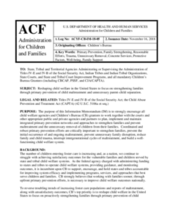This page contains documents and other resources related to children's care in the Americas. Browse resources by region, country, or category.
Displaying 1621 - 1630 of 3191
In this article, the author provides a synopsis of some current statistics about foster care and the experience of the foster care system in the US and offers an overview of a handful of relevant grief theories and expend a call to those within the field to develop more unique grief theories and interventions for children in the foster care system.
Using data from age 3 of the Fragile Families and Child Wellbeing Study, the current study explores the complex relationships between U.S. childcare subsidies and neglect.
This article from the New York Times tells the story of one Guatemalan mother, among others, who migrated to the United States, was separated from her daughter, and now faces the threat of losing custody of her daughter because the girl is a US citizen.
The study reported here uses a random-assignment evaluation design to assess the impact of the YVLifeSet program on young adults transitioning to adulthood from the child welfare and juvenile justice systems in the state of Tennessee.
This study sought to investigate associations of caregiver-child closeness, monitoring, and dating communication with youth's sexual initiation, sexual partners, and unprotected intercourse over the subsequent 12 months.
This study replicated and extended previous research by conducting a follow-up study of 107 families (90% response rate) 17 years after pre-service training. Consistent with previous research we found a small proportion (10%) of families who provide a disproportionate amount of care in terms of length of service and number of children fostered, approved to foster, adopted, and removed at families' request.
This paper reports on an exploratory cross-sectional online survey of child protection service providers from five child protection agencies that investigates the struggles faced by child protection workers when responding to complaints made by acrimonious ex-partners within the context of child custody disputes.
Although the extant literature provides rough estimates of the number and characteristics of children living in most care arrangements, research on kinship probate guardianship is especially scarce. This article focuses on kinship probate guardianship in an effort to build the literature on this understudied population.
This comprehensive narrative review identifies the use of motivational interviewing (MI) in child welfare (CW), the outcomes of MI use and the gaps in the literature.
The purpose of this Information Memorandum (IM) is to strongly encourage all US child welfare agencies and Children’s Bureau (CB) grantees to work together with the courts and other appropriate public and private agencies and partners to plan, implement and maintain integrated primary prevention networks and approaches to strengthen families and prevent maltreatment and the unnecessary removal of children from their families.


